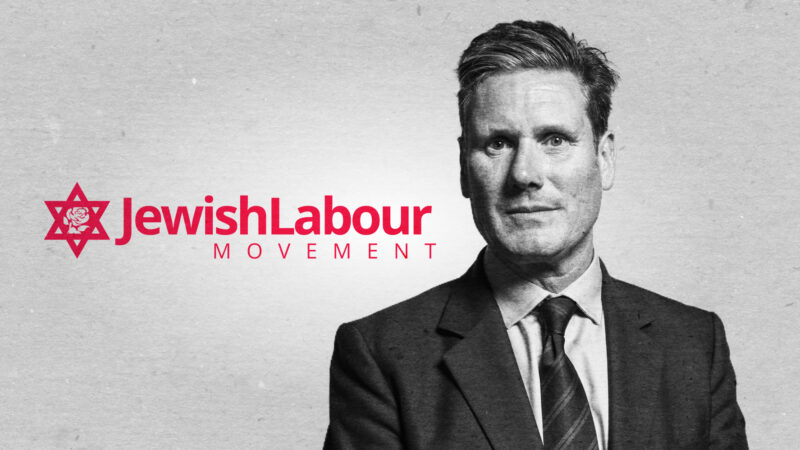
This morning, Jewish Labour Movement national secretary Peter Mason and I joined a video call hosted by Keir Starmer, with Angela Rayner and other Jewish community organisations, to discuss how best he can get a grip on antisemitism in the Labour Party.
Given how the all-consuming threat of coronavirus has turned all our worlds upside-down, we took it as a really important signal that Keir has focussed on the issue from the get-go in many of his comments since being elected on Saturday, from his acceptance speech onwards.
JLM’s membership has been at the heart of Labour’s struggle with antisemitism. As the climate of hate worsened, people have felt alienated and even hounded out of Labour – two of them, Luciana Berger and Louise Ellman. Years, decades in some cases, of campaigning commitment and party activity disregarded as members were told they were ‘Red Tories’ or were ‘weaponising’ the very real racism they faced for political ends. This was all encouraged and abetted by the party’s previous leadership.
It’s little wonder people have flocked to JLM’s banner, finding true solidarity and comradeship – nor that our membership has more than trebled over the past couple of years and that our leadership hustings was the best-attended of the campaign.
As we explained to Keir, throughout the last four years, JLM used its unique role as the sole Jewish affiliate to the party in good faith. We engaged early on with the previous leader’s office and key staff at Southside. We successfully moved rule changes at Labour Party conference, outlawing abuse against all members with protected characteristics. We delivered training in CLPs and Labour clubs up and down the country.
All of this, only to be undermined and denigrated by Corbyn’s leadership and senior staff. Indeed, other organisations were promoted as a way of getting around us and majority community opinion.
After the many times our good faith engagement was abused and thrown back at us – after we discussed the radical step of disaffiliating from the party – we took the difficult decision to refer the party to the Equalities and Human Rights Commission.
We worked with brave whistleblowers, both existing and former staff and officials, some of whom the party shamefully threatened to sue, to document Labour’s failed processes. The way that the leadership interfered in the system and to prioritise protecting political allies over expelling racists.
When the EHRC’s report is published later this year, it will come as stark reading – and we will not pull our punches. I urged Keir, for the sake of a clean break, to publish the party’s submission to the EHRC, however flawed. It was disgraceful that this was never even shared with Labour’s national executive committee.
We’ve always said that the heart of the problem for our members is a toxic culture, which creates an unwelcoming environment for them, offline and online, nationally and at CLP level. Changing that culture will be a long haul – it will come down to political will, independent processes and education.
We want to reset our relationship with the party on training. But we’re clear – it can’t be used as a get-out sanction, and it will never remove the necessity of making sure that people who frankly have no place in the Labour Party shouldn’t be allowed to join in the first place.
I’ve no doubt that, under Keir’s leadership, there will continue to be issues to contend with. Detoxifying a party doesn’t happen overnight – electing a new leader is a good start, but it is only a start. There’s still a lot to be done, and it would be foolishly optimistic to think that all those members that denied there was a problem (and castigated JLM for saying so) have suddenly changed their mind.
However, Keir has clearly showed he has the political will to do whatever it takes to – as he put it – “tear out this poison by its roots”. His words give us the reassurance that we can once again engage in good faith with him, Angela, and a reinvigorated leader’s office and party HQ, and work with them to put right this shameful wrong.
In the coming week, JLM’s officers, including our formidable past and present parliamentarians, Margaret Hodge, Ruth Smeeth and Louise Ellman, look forward to discussing in more detail with Keir what needs to happen.
Our members want nothing more than to be able to return to a party that isn’t racist and is restored to being a safe space for Jews everywhere. So we can focus on the reasons we all joined Labour in the first place – fighting for social justice, strong public services, an economy which works for everyone – and campaigning for a Labour government to deliver just that.
When I was elected as JLM national chair a year ago, the future for JLM and its relationship with the Labour Party looked bleak. Now I feel we can properly celebrate 2020 as the centenary of our affiliation to the Labour Party.




More from LabourList
‘Tackling poverty should be the legacy of Keir Starmer’s government’
‘The High Court judgment brings more uncertainty for the trans community’
‘There are good and bad businesses. Labour needs to be able to explain the difference’